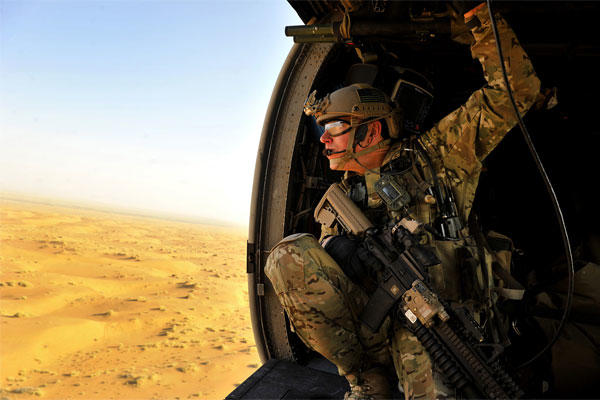KANDAHAR AIRFIELD, Afghanistan -- The toy trains went into a box and the toy planes came out after his first plane ride. He was only five years old, but after that first ride, he was hooked and knew he wanted to be a pilot.
Capt. Brian Dicks, HH-60G Pave Hawk combat rescue pilot with the 26th ERQS here is a native to Alliance, Ohio, and is deployed from Davis Monthan Air Force Base, Ariz.
With both of his grandfathers in the military, he said it felt like a calling to join the service.
Dicks graduated from the University of Cincinnati, Ohio, and commissioned as an officer. Although he always knew he wanted to be a pilot, he had an inkling it would be helicopters, he said.
While his grandfather was his hero growing up, his heroes today are the men he serves with, he said.
"The last couple of years I have seen them do some amazing stuff," he continued. "I can't say anyone else is my hero when they are out here saving lives."
Being in the right place at the right time is sometimes all it takes to save a life, Dicks explained.
"In Helmand Province in 2010, we were hopping from forward operating bases to forward operating bases picking up patients who had minor injuries," he said. "We received a call about a two-month-old Afghan infant who had fallen into a well. Once out of the well, her father ran a mile and a half to the nearest base. A joint terminal attack controller knew we were in the area, so he called us and we were only one minute away. We landed, the PJs got him and his daughter in the back and we took them to Bastion Airfield where they got her heart beating again."
It is this serendipity that amazes the helicopter pilot.
"If we didn't have to pick up the guy who broke his leg, we wouldn't have been in that specific location at the right time," he said. "To see all the events and people link together is amazing."
Though the pilot has flown a little more than 500 missions, he still keeps in touch with the family of a fallen Airman.
"We launched to recover Staff Sgt. Christopher Frost who was on a Mi-17 helicopter when it went down in Iraq," Dicks said. "I happened to be flying a flag for my grandfather that day. After we came back, I was able to find out who his wife and widow were and send them the flag that was flown that day. I still try and keep in touch with his family. You don't get a lot of that in this job."
Dicks is the lead pilot of the helicopter, but he wouldn't be able to get off the ground without his crew, he said.
"We rely on each other so much," Dicks added. "I rely on them to keep me safe and give me a reality check if it's needed, and they expect the same from me."
"I am the one who inspects the aircraft, so he trusts me to make sure it is mission ready," said Tech. Sgt. Will Frisch, 26th ERQS flight engineer. "Opinions matter a lot in this type of job. If something doesn't look right, we speak up to the pilot. And that works both ways. There is a mutual respect and what we say is taken into consideration. We have each other's lives in our hands."
Frisch, who has known Dicks for two years, said he liked the captain's approach on getting the job accomplished.
"He is very intelligent, but not to the point of fault," he added. "He knows his job very well and helps you do yours better. It has been very enjoyable working with him. There is no nonsense with him. He just wants to get the job done and done well."
But for Dicks, it is more than just a job.
"I enjoy the challenge of making things work," Dicks said. "The most rewarding part is saving a life. That'd be the best part - knowing they are going back to their families."
"This is where I was meant to be," he said.





























